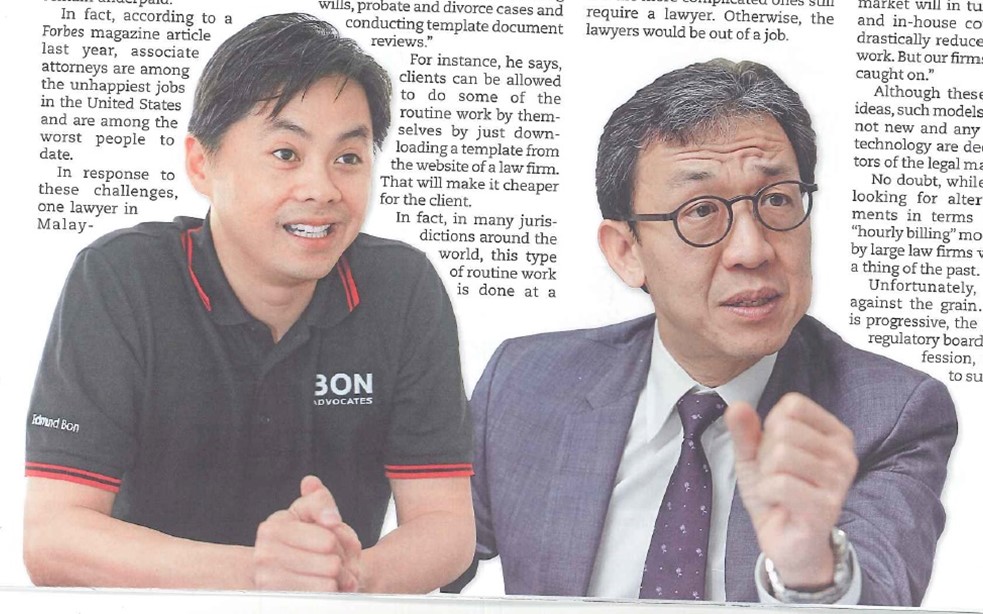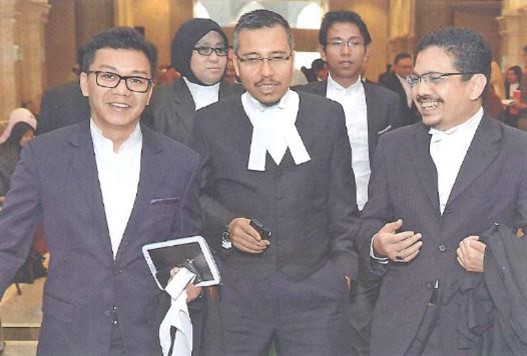By Rita Jong | The Heat
Legal practice is usually seen as an esteemed profession. Lawyers speak eloquently and usually make sure they win an argument – inside or outside the courtroom.
But over the decades, people’s perception of lawyers has taken a beating. They are now seen as connivers, liars and cutthroats. Over and above that are the numerous jokes about lawyers.
There can be any number of reasons for this state of affairs. Perhaps it is how lawyers try to intimidate witnesses in the courtroom. Or it may be public perception that lawyers would do anything for a fee, including helping an accused person – who is deemed guilty in the public eye – get away scot-free.
An increase in the number of TV series depicting wacky or scheming lawyers has also put a dent on their image. One good example is Ally McBeal. It depicts a woman lawyer named Ally McBeal who is haunted by visions of a dancing baby and who is more obsessed with searching for a soul mate and worrying about her biological clock than in concentrating on her cases. Then there is Damages in which its main character, Patty Hewes, is portrayed as a powerful and scheming lawyer.
For good or bad, many children still aim to become lawyers because they view this profession as elite and because they think there is a lot of money to be made in legal practice. But truth be told that is not always the case. Of course some lawyers make it big but in most cases, the junior lawyers in large law firms continue to work long hours but remain underpaid.
In fact, according to a Forbes magazine article last year, associate attorneys are among the unhappiest jobs in the United States and are among the worst people to date.
In response to these challenges, one lawyer in Malaysia is going against the grain in an attempt to shake up the legal profession and elevate its image. Edmund Bon, who has been in legal practice for 16 years, has gone through what every young lawyer has, and he is now trying to dispel the myth that more young lawyers are calling it quits.
Bon, who describes himself as “not so young” at age 39, concedes that his progressive ideas may not sit well with the regulatory board as well as the larger firms. He knows he will be seen as “spoiling the market”.
He knows he will be labelled as a disruptor but he hopes that one day the legal profession will be able to set a precedence and become more comfortable with new ideas. He wants groups representing lawyers to look beyond just protecting them but to also make legal services more accessible to the public.

Revolutionalising legal practice
Bon says the legal profession could evolve into a model where young lawyers need not have to work such long hours but can continue to offer the same or higher quality service to clients. This is possible, he adds, by making full use of new technology.
“We have yet to catch up. For instance, in the United Kingdom and the United States, the use of technology has enabled lawyers to offer equally efficient services at a lower price,” Bon tells The Heat in a recent interview.
“In Malaysia, we are still stuck in the traditional law firm model of partnership. We have not fully optimised the use of technology in managing cases such as drafting wills, probate and divorce cases and conducting template document reviews.”
For instance, he says, clients can be allowed to do some of the routine work by themselves by just downloading a template from the website of a law firm. That will make it cheaper for the client.
In fact, in many jurisdictions around the world, this type of routine work is done at a very low cost. Speed and a lawyer’s assistance seem of no importance anymore. Hence, Malaysia should be looking into this area in dealing with routine work, which can actually be done by people who need not be legally trained.
This “grey area” in the legal profession will no doubt empower the masses and in turn, educate the people on what a legal process consists of. Of course, some can be done on their own with a little legal guidance but the more complicated ones still require a lawyer. Otherwise, the lawyers would be out of a job.
Reducing legal fees will benefit people
Besides the routine work in certain straightforward cases, reviewing contracts can also be done practically by people other than lawyers.
Bon says: “Many law firms in the US and UK are outsourcing contract reviews or document discoveries to India and Belfast where there are literally factories of people who take on such tasks.
“This idea of a competitive market will in turn benefit clients and in-house counsel as it will drastically reduce the cost of legal work. But our firms here still haven’t caught on.”
Although these are progressive ideas, such models and thoughts are not new and any model involving technology are deemed as “disruptors of the legal market”.
No doubt, while clients are now looking for alternative arrangements in terms of charges, the “hourly billing” model still practised by large law firms will eventually be a thing of the past.
Unfortunately, Bon is going against the grain. While his idea is progressive, the Bar Council, the regulatory board of the legal profession, seems resistant to such ideas.
Ways to help young struggling lawyers
Among Bon’s suggestions is to help give young lawyers and small law firms a competitive edge over the big law firms. He proposes moving towards a “chamber style system” where individual barristers, seniors and juniors, share a roof and infrastructure such as photocopy and fax machine and a clerk who brings in the work and passes it to the respective lawyers.
“Malaysia only allows a partnership model, an archaic model. In the legal profession, people come to you for your name. Hence, the lawyer should be self-employed and allowed to collect his own fees. This will also benefit clients as they would be able to get expert advice at a lower cost,” he says.
“The group legal practice allows law firms to join together under one roof. This is different from the chamber model because the lawyers working under this are still not self-employed.”
Bon, who has since January set up his own law firm, says his and seven other small firms are coming together to test the market. Although they are different law firms, they have one brand name. This, he adds, would allow them to achieve economies of scale.
Bon believes the group legal practice and chamber style system is what the profession needs to move forward.
“Of course the big firms don’t like this but we need to talk about it now as this is what we envisage will happen in 2020. We should be ready and embrace it rather than realise that by 2020, we are left behind,” he says.

But the regulatory body says…
The Bar Council, however, seems to be holding back and needs more time to get comfortable with new ideas.
Its president Christopher Leong says small firms are far from being wiped out and asserts that junior lawyers are working long hours, between 10 and 14 hours a day, be it in small or large firms.
“There are approximately 15,800 lawyers and 80% of them are from small firms. Small firms make up the bulk of legal services providers in Malaysia and I don’t see competition wiping them out,” Leong tells The Heat.
“If the small firms feel they can be more competitive if they are able to grow in numbers, they have one option, that is to be a bigger firm and not by opting to do group legal practice.”

He says there is no such thing as allowing lawyers to come together to operate like a firm, when they are not a firm.
“No doubt the group legal practice has been done in Singapore but that was done there for a particular purpose of encouraging small firms to eventually merge into one firm and brand themselves as one.
“But I was informed by the Singapore practitioners that the objective failed. However, these law firms found they had the best of both worlds. They found they were able to remain sole proprietors of the practice and yet operate and brand themselves as large firms. So the main objective of a group legal practice was not achieved,” he adds.
Leong, however, seemed optimistic about assisting smaller firms meet overhead costs by ‘rolling out some changes’ soon.
The Bar Council is looking at changing some rules to allow small firms to share backrooms, staffing and infrastructure costs. This may enable firms to afford to maintain a library of their own, if they come together.
“We are looking at rules to enable them to share such facilities without them compromising on confidentiality as under current rules, sharing premises is not allowed,” he says, emphasising that this is not the chamber style system.
Leong also says that posting guidelines and templates for routine work is not the way to go because lawyers are supposed to offer legal advice.
“Sure, if a person is clear on what they want to achieve, then yes, with very simple guidance they can do it themselves. But it raises the questions of whether a person knows his options. He would think he has no options. That is the limitation,” he says.
“But if you had even a 15-minute chat with a legal adviser, they would be able to tell you what other options are available. And if a lawyer wishes to provide legal services, that lawyer should make himself available to the client. In case the client has questions, the lawyer ought not to assume that the client would have no questions because the ‘template’ is clear.”
Providing service, not templates
“This is not a factory. Although there is some work where you can work off a template, the lawyer should still sit down with the client to find out whether the template as it is, is suitable for the client or is sufficient to cover the needs of the client,” says Leong. It may, but you still need to find out.
“That is what providing legal services is. It is not about producing a template document and saying, ‘here, I charge you very little but you take this and read it for yourself’,” he adds.
That is not providing legal services. Indeed the legal profession in Malaysia needs some uplifting and changes.
Bon’s suggestions in shaking up the legal profession are progressive, but they are not new. It is just his way of expediting and simplifying cases and is a solution to what is perceived as an ‘oppressed’ situation for young, overworked lawyers.
We need to reward our young lawyers fairly and that is the basic principle.
Reshaping legal education
Young law graduates are not equipped with the right tools to face the real world in the legal profession.
Lawyer Edmund Bon, who tutors International Human Rights Law at Universiti Malaya, says the programme does not prepare potential lawyers for the legal service.
“The skills which are being taught are a method for the 1930s. Everybody learns the same thing and comes out doing the same thing. But we are now in 2014 with so many different jobs and opportunities,” he says.
He is of the view that young lawyers are still in the “banking system” under which they are given legislation such as the Criminal Procedure Code and are expected to regurgitate it all out. “The more they regurgitate, the more marks they get,” he says.
But that, he says, does not help solve legal cases which they have to deal with in practice, as all cases are human problems based on different facts.
Bar Council president Christopher Leong says an employability survey shows new entrants into the legal profession do not meet the expectations of employers.
“I have come across young lawyers who are bright but lack experience, and some who may not find it easy to practise,” he says.
“A few years ago, we commissioned an employability survey of law graduates. It was not a survey on the quality of universities or their law degrees. It was to find out what employers looked for among new entrants into the profession. The survey showed that by and large, law firms found it difficult to find new lawyers who met the criteria and expectations of employers,” he says.
Among the criteria that employers look for in fresh graduates are a good command of English, both written and oral, analytical skills (being able to comprehend information given, identify important issues and solve problems), and loyalty to the firm in terms of continuous service.
“Many new recruits are very mobile. They find it difficult to have continuity. Imagine, you come to me and tell me your problems. Then the next time, you turn up I am no longer there. Very often it is not just having to repeat yourself, but it boils down to a question of confidence,” Leong says.



